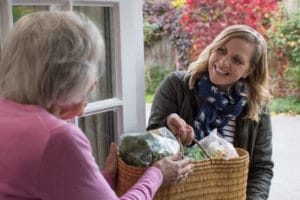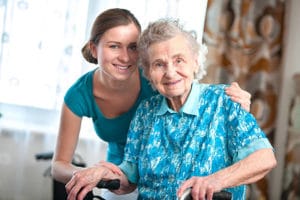The Quebec population is aging. The caregivers for the elderly will increase more and more.
Their involvement is significant in our society. In fact, 70 to 80% of the care received by a person suffering from a neurocognitive disease is provided by a caregiver. Furthermore, as stated by the Auditor General of Quebec, caregivers help save 4 billion dollars to the Quebec health system every year.
Despite their invaluable contribution, they often work in the shadow and receive little recognition.
That is why this article is meant to value their contribution. Therefore, I will talk about their everyday life, the difficulties and benefits pertaining to this role, of their rights, the conciliation of work/caregiving and the current and planned financial support.
So that we can finally recognize the social and economic value of the caregivers for our elderly.
What is a caregiver for the elderly?
A senior caregiver is someone who provides support and care to a third or fourth age person with a disability. There is a family or emotional relationship between the caregiver and the elderly. Often this role is taken for granted and most caregivers do not see themselves as such. However, when there is a significant loss of autonomy, this role involves significant responsibilities that require a lot of adjustment.
Caregiving according to the gender
To this date, the role of the caregiver is held by more women than men. In fact, according to the Council on the Status of Women (2018), 58% are women. However, this reality tends to change because more and more men are taking the role.
Everyday life of caregivers for the elderly
At the beginning of the relation between the one giving the care and the one receiving it, the role of the caregiver can be offering emotional support, and accompanying for appointments and help for the transportation. As soon as the loss of autonomy increases, the caregiver takes on more and more the activities of everyday and domestic life (ex: meals, medication management, dressing), and he/she becomes dispenser of complex care (ex: care of wounds).

The difficulties of the caregiver for the elderly
Because of their big physical and psychological involvement, many caregivers feel an accumulation of stress. This can lead to anxiety, depression and exhaustion.
The caregivers can be inclined to adopt less healthy eating habits, reduce their physical activity, reduce their sleeping time and use more medications.
It is sometimes difficult to find a just balance between the duties of a caregiver and other family, professional and social roles. They often spend less time on leisure and social activities.
The caregivers have sometimes to face a pre-death grief, which is very difficult. This happens when the person changes slowly (for example in the context of a neurocognitive disease).
At the point that the person is not the way she was before. The caregiver has to give up his/her future plans with the loved one and loses the quality of exchanges. The pre-death grief is different from mourning because the person is still present and always shares our everyday life. The pre-death grief brings about guilt, anger and helplessness.
Lastly, the caregivers are sometimes confronted with difficult choices concerning housing, level of care and support at the end of life.
The benefits of being a caregiver for the elderly
The role of caregiver for the elderly is certainly demanding, but it also has certain benefits. So, it is very rewarding to contribute to the well-being of his/her loved one. Caregiving also allows you to maintain a close relationship with your loved one. Lastly, to be a caregiver brings himself/herself to better know oneself, to better define their own needs and limits.
The rights of the caregiver for the elderly
Given the magnitude of the task of caregivers of seniors and since they are part of the care team, it is important to emphasize their rights:
Right to a just and complete information
The caregiver has to be informed of the resources in order to carry out well his/her tasks for the person helped (what are the services offered like support at home, access to the health professionals, respite, and the resources specifically for the caregiver).
Right to recognize one’s own expertise
According to his/her degree of involvement, the caregiver can hold a sharp knowledge and a complete one of the person assisted. It is essential that he/she is involved in the decisions surrounding the person helped. One cannot underestimate the contribution of the caregiver in the development of the treatment plan. His/her continuous and regular contact with the person helped makes him/her an expert of the situation.
Right to accessibility
Increase accessibility to elements likely to facilitate the tasks of the caregiver. For example, access to the medical file of the person helped. Or better access to financial resources in the way of limiting certain expenses (ex: parking fees, meal costs in institutions).
Work/caregiver conciliation
It is recognized that caregivers of seniors are getting poorer when they take care of a loved one, particularly when the care requires a commitment of 20 hours or more per week.
This is why the job market should adapt to the realities of caregivers of seniors. This flexibility could be:
- To include the caregivers in the law on labor standards. By allowing, for example, to every caregiver to take a certain number of days off per year (few of them with pay) in order to provide care and support to a loved one.
- To set up, at the Ministry of Labor, Employment and Social Solidarity, an employment reintegration program specifically targeting caregivers. This is in order to strengthen the recognition of their achievements (including their expertise as a caregiver), and to equip them in the search for employment or training.
Financial support for caregivers
On the financial aspect, there is in Canada three economic support measures for caregivers (1- the Canadian tax credit for caregivers; 2- compassionate care benefits; 3- a recognition allowance for caregivers of veterans). In Quebec, the caregiver support measures are refundable tax credits.

These financial support measures are a step in the right direction, but they are not enough to deal with the aging of the population. Insufficient to alleviate the pressure on caregivers.
Caregivers should therefore be guaranteed economic support enabling them to exercise their role without becoming impoverished. It could be :
- To create a provincial allowance to support caregivers that spend 20 hours and more on daily care and support to one person.
- To modify the provincial tax credits for caregivers so that they are no longer based on the profile of the person helped, but rather on the costs incurred by the caregivers.
- The granting of an annual pension credit under the Quebec Pension Plan (QPP) to any contributor who withdraws from work to take care of a loved one.
The role of caregiver for the elderly: Conclusion
We can feel very alone being a caregiver for the elderly. We can have the impression that nobody understands what we are living. We can often feel overwhelmed by the responsibilities. Particularly, when the loss of autonomy of our loved one becomes bigger and that the care becomes more complex. This can result in chronic stress and a difficulty to maintain good life habits.
On the other hand, several protective factors can help us as informal caregivers: promoting their rights within the health system and society, encouraging work / family aid reconciliation measures, improving financial support and being well surrounded.
Without forgetting that there are different resources for the elderly and the caregivers.
Social enterprises for the elderly and caregivers (in Montreal)
First, social enterprises carry out economic activities for social purposes, that is, they sell or exchange goods and services with the aim of making a profit which is then invested in a social mission.
Social enterprises of home assistance (EESAD)
The EESAD (https://eesad.org/) give support at home by providing domestic services (housekeeping, taking care of clothing, meal preparation, errands, etc.) for persons with disabilities. This type of service is financed by beneficiaries, that contribute according to their revenues, and by the government of Quebec.
The EESAD can also offer services to the caregivers such as respite.

- La Grande Vadrouille (housekeeping, meal preparation, errands, respite) 514-341-0443
- Plumeau, Chiffon et compagnie (housekeeping, meal preparation, errands, respite) 514-523-6626
- Répit-Ressource de l’Est de Montréal (respite) 514-353-1479
- Coopérative de solidarité Novaide (housekeeping, meal preparation, errands, respite) 514-278-6767 poste 200
- Coup de Balai inc. (housekeeping, meal preparation, errands, respite) 514-484-4266
If you are over 70 years old, you can benefit from a tax credit for home support for the elderly. It’s an equivalent financial aid of 35% of expenses paid for services of home assistance.
Social enterprises in the food area
- Santropol Roulant (meals on wheels service, food preservation, farmers’ markets, bio baskets) 514-284-9335
- Projet PART (frozen food service, work and social integration of persons with a mental health problem or psychosocial issue) 514-526-7278
A social enterprise in the field of adaptive clothing
- Groupe Innova (creation and sale of adaptive clothing for persons with loss of autonomy, social and work integration of persons with a mental health problem)
- Boutique Chic chez vous: 1-888-923-9366
- Boutique du 3e âge: 450-672-8976
Please note that if you have a medical prescription, you are exempted of paying taxes on every purchase of adaptive clothing.
A social enterprise specifically for the caregivers
- L’Appui (services to orient the caregivers, directory of resources by region, support service Info-caregiver) 1-855-852-7784

Wow ! Ça a dû vous demander beaucoup de recherches pour écrire cet article. C’est vraiment riche en information et c’est très bien documenté. Bravo ! Je vais recommander cet article de blogue à tous ceux qui sont des proches aidants dans mon entourage. Merci beaucoup !!!
oui ont est proche aidants mais comme moi j ai 76 ans et mon mari a 72 ans c est moi qi s occupe de lui proche aidant jele garde a la maison et je lui donne tous ces medicament lave son linge il a une trakeo paralyse sur cote gauche ne parle pas et gave aussi et ne marche pas mais il est content d etre a la maisin pension ok mais un surplus sera bienvenue c est moi qui vas en ambulance avec lui et le preier soir a l hopital je dors la pour parle pour lui au medecinet apres tout les jours que j y vais meme si il est malade il veut revenir a la maison avec nous et tant que je vas etre capable je le ferait c est une question de temps que le docteur a dit sa fait 43 ans que nous somme mariees un peu de sous de plus que je pourrait faire venir des repas de temps en tempps moi aussi je demande pas 1 million mais une petite compensation surtout que notre retraite est bafoue avec cette maladie il a fait un acv le 8 novembre 2018 et depuis a la maison le clsc vienne 3 fois par jour pour le laver et changer ses couches ne peut meme pas se lever non il et moi ne veulle pas aller dans un institue ont en a trop vus et c est notre droit aussi ont c est prois sa a nous deux un malade l autre prend soin de l autre je sais que nous aves notre pension mais notre retraite est sur le camp les autre aidant recoive une compensation mais pas nous parce que nous avon notre pensionont la gagne nous aussi sa vous coute moins chere et en plus il est tres heureux avec nous merci
Effectivement, c’est entièrement votre droit à vous et votre mari d’opter pour le maintien à domicile.
Seriez-vous éligible pour des prestations de compassion (fédéral)?
À la lecture de votre récit, il serait nécessaire que le gouvernement du Québec crée une allocation provinciale de soutien aux proches aidants.
Dernier point: Puisque vous avez plus de 70 ans, vous pouvez bénéficier d’un crédit d’impôt pour le maintien à domicile des aînés. Il s’agit d’une aide financière équivalente à 35% des dépenses payées pour des services de maintien à domicile.
Merci pour votre commentaire.
This is a really good tip especially to those fresh to
the blogosphere. Simple but very precise info… Thank you
for sharing this one. A must read post!
That is a really good tip particularly to those new to the blogosphere.
Brief but very accurate info… Many thanks for sharing this one.
A must read article!
Its like you learn my mind! You seem to understand so much
about this, like you wrote the guide in it
or something. I feel that you just could do with a few % to pressure the message house a bit, but other than that, this
is great blog. A fantastic read. I’ll definitely be back.